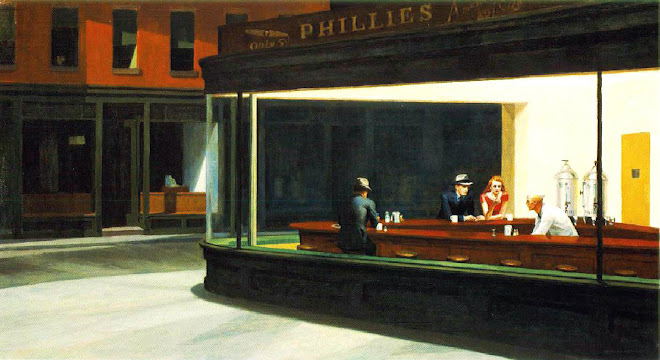
Thank the gods for the Kingsmen. Yes, the Kingsmen, popularizers, in 1963, of such unforgettable musical achievements as “Louie, Louie,” and “The Jolly Green Giant.” (They actually did a version of “Mustang Sally” and “Money --That’s What I Want--” too) These predecessors of today’s garage bands had few pretensions to greatness, but challenged, in their own unwitting way and only a few years after the witch hunts of McCarthy (see Good night and Good Luck), the cultural torpor of late 1950’s mid-America. Today, I find that this music also makes great laundry-folding background music, as I sort through the whites and the darks. (For some activities, one desperately needs something in the background.)
Apparently, “Louie, Louie,” was presumed by many to have objectionable (read, pornographic) lyrics and was, at one point, condemned by such defenders of air-wave decency as the Governor of Indiana, Matthew Welsh. (I recall that the kids in my 7th grade class sure were convinced that the lyrics were “dirty”. Although it was a complete mystery to me how anyone knew what the Kingsmen were singing.) When the Federal Communications Commission conducted an investigation into the lyrics of “Louie, Louie,” they concluded that, “The record is unintelligible at any speed we played it.” This, I think, speaks volumes about, on the one hand, the genius of the Kingsmen (literally creating a tabula rasa on to which anyone could project what they wanted) and on the other hand, the antipathy that seethed in early 1960s America for what was then a blossoming youth culture that would soon lay siege to the staid sensibilities of America, with a triumvirate of sex, drugs, and rock n’ roll. The “Establishment” was convinced that the kids were being corrupted by dirty music. And, of course, they were right. But certainly not by lyrics of “Louie, Louie.” Essentially “Louis, Louis” had no lyrics.
The uproar over “Louie, Louie” was a long, long, long, time ago. But, time, of course, has a way of both slipping away and lingering around, simultaneously. Time is both slippery and sticky. It is evanescent and unending. Now you see it, now you don’t. Here today, gone tomorrow. Etcetera, etcetera. “Louie, Louie,” hit the airwaves over 40 years ago and yet, it seems like only a moment ago. A brief pulse in the great stream of time.
Ahh, “the great stream of time.” It’s very much like the great stream of consciousness. Only, in my case, it’s not exactly a “stream.” More like a “rivulet.” Or maybe even just a few drips. Yes, “drips” of consciousness. That’s it.
But let me first observe that consciousness, or perhaps more accurately, my consciousness, is a weird tangle of impressions and sensations and autobiographical memories and associations. It’s composed as much of the little things that skulk around in the background, as it is the big things that lumber, like locomotives, in the foreground. I’m as consciousness of the feel of this keyboard at which I’m now typing, as I am of my abstract and fuzzy ideas about the vast expanse of time.
Of course, consciousness has some relationship to identity, and as, mentioned, memory—autobiographical memory. (Speaking of identity, let me also observe that it seems to me that who we are, and what we are, is comprised as much by the things that we avoid (steer clear of) as the things that we embrace, whole hog. We are comprised by what we aren’t (or won’t allow ourselves to be) as much as by what we “are.”) So anyway, like I was saying, we conscious beings—even we of little, tiny ideas---are physical things, embedded in a specific point in time and history and nature. Connected to our genetic ancestors and our specific culture. Oh yes, and our given ecology and language (the latter an inheritance form the past that we recreate and innovate, simultaneously.) We are not ethereal and immaterial “souls” afloat in some perfect ether. We are blood and flesh and the composite of our experiences and our place of birth, plus some genetic stuff that gets factored in, that we don’t get any vote in.
But enough of this digression, let’s get back to what’s really important: “Louie, Louie.”
“Just what were the lyrics to Louie, Louie, anyway??” The Kingsmen spent 35 dollars to record their song, and the quality of the recording accords with this magnitude of their investment. Who can tell what the lyrics are by listening? So I looked them up.
Louie Louie, oh no
Me gotta go
Aye-yi-yi-yi, I said
Louie Louie, oh baby
Me gotta go
Fine little girl waits for me
Catch a ship across the sea
Sail that ship about, all alone
Never know if I make it home
CHORUS
Three nights and days I sail the sea
Think of girl, constantly
On that ship, I dream she's there
I smell the rose in her hair.
CHORUS
Okay, let's give it to 'em, right now!
GUITAR SOLO
See Jamaica, the moon above
It won't be long, me see me love
Take her in my arms again
Tell her I'll never leave again
CHORUS
Let's take it on outa here now
Let's go!!
If the governor of Indiana thought that Louie, Louie was suggestive, what do you think he would have made of these lyrics, from the song, “Gone Dead Train” which, as you will recall, appeared some years later, in the movie Performance, starring Mr. Mick Jagger. The song was sung by Randy Newman:
[Words and music by Jack Nitzsche & Russ Titelman.]
My engine was pumpin' steam and I was grindin' at you hard and fast
I was burnin' down the rail tryin' to heat the way
Haulin' ass and ridin' up the track
And I laughed at the conductor who was tellin' me my coal would never last
When the fire in my boiler up and quit before I came
Now ain't no empty cellar need a gone dead train
Once was at a time when I could Mama shave 'em dry
And raise a fever on ice-down chill
Waiting at the station with a heavy loaded sack
Savin' up and holdin' just to spill
Shootin' the supply from my demon's eye
'Stead of waitin' for a time, I hope I will
When the fire in my boiler up and quit before I came
Now ain't no empty cellar need a gone dead train
Yeah it's a gone dead train
You got to help it to burn
You know it's a gone dead train
You got to teach it to learn
There ain't no easy way when the daily run a downhill pull
And there ain't no easy day, wishin' for some jelly roll
There ain't no switch been made to let a juicy lemon find
A spring to run a dry well full
Then the fire in my boiler up and quit before I came
Ain't no empty cellar need a gone dead train
Yeah it's a gone dead train
You got to help it to burn
You know it's a gone dead train
You got to teach it to learn
You know it's a gone dead train
You got to help it to burn
You know it's a gone dead train
You got to help it to learn
Baby, it's a gone dead train
It's a gone dead train
“Louie, Louie” was really just “Little Bo Peep,” by comparison to, “Gone Dead Train.”
Ah, but both “Louie, Louie” and “Gone Dead Train” were a long time ago.
Now, I must get back to the laundry-folding. Back to the quiet zen-like, stillness of a blank consciousness.
Back to the lyrics of “Louie, Louie.”
 MMC has not made an entry for quite some time. You, dear reader/viewer/cybernaut, have probably been wondering, "Will Western Civilization continue in the absence of the pithy observations by Moo Moo Camus?" Your inner voice quickly responded, " Sure, No Sweat!"
MMC has not made an entry for quite some time. You, dear reader/viewer/cybernaut, have probably been wondering, "Will Western Civilization continue in the absence of the pithy observations by Moo Moo Camus?" Your inner voice quickly responded, " Sure, No Sweat!" 


